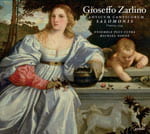Gioseffo Zarlino
Canticum Canticorum Salomonis — 2007
In 1541, a young musician, scholar, and recently ordained priest named Gioseffo Zarlino left his native Chioggia for Venice. In La Serenissima, he embarked on advanced studies in music, logic and philosophy, Greek and Hebrew. Such was ZarlinoÕs zealous quest for knowledge that he himself became known to later scholars of the Renaissance as the most highly regarded music theorist of the sixteenth century.
Read Release Information…
Read CD Booklet….
Reviews
“Early music is more volatile than rock music. Hot new groups keep appearing, new personalities keep emerging, and early music has a dynamism that is noticeably absent from other parts of the classical music scene. One of the hot groups right now is Ensemble Plus Ultra under their director Michael Noone. Born in Sydney, Michael Noone studied at the University of Sydney and King’s College, Cambridge, and specialises in Spanish Renaissance music. He is known especially for his work in the archives of El Escorial and the Cathedral of Toledo, and his CD Morales en Toledo featured here back in 2005. Ensemble Plus Ultra record for the enterprising Spanish Glossa label who are one of the few companies still placing importance on the design and presentation of their CDs. I am playing music from their new disc (beautiful artwork above) of sacred choral music by the 16th century Venetian Gioseffo Zarlino in my Future Radio programme at 5.00pm UK time on Sunday 20th January. Zarlino is best known for his great treatise, Istitutioni harmoniche of 1558, and is little known as a composer.”
Overgrownpath.com
“The performance by Ensemble Plus Ultra under Noone is exemplary throughout”
Allmusic.com
“Famed in music history more as a music theorist than as a composer, Zarlino (1517-1590) became maestro di cappella at St Mark’s; here, conductor Michael Noone – renowned for his discoveries and recordings of Spanish polyphony – offers première recordings of ten Song of Solomon motets which should seriously boost Zarlino’s reputation. Composed as part of an unfinished project to set the entire book of the Bible to music, the motets use a text by the revisionist Biblical translator Isidoro Chiari (1495-1555). Zarlino intended the chapter structure of the text to be reflected by ascending modes in the music; each voice articulates the whole text, and Zarlino avoids ‘madrigalisms’, the music maintaining constant five-voice polyphony. Ensemble Plus Ultra comprises familiar names from the among the British crack troops of early music vocalism, recorded in the London Church of St Peter ad Vincula, in a satisfying middle distance balance; this is a must-have purchase”.
Graeme Kay, Early Music Today (June-July 2008)
Michael Noone, Director
Ensemble Plus Ultra
Sally Dunkley, Grace Davidson, Clare Wilkinson, Lucy Ballard, Mark Chambers, David Martin, George Pooley, Julian Stocker, Gerry OÕBeirne, Warren Trevelyan-Jones, Angus Smith, Giles Underwood, Charles Gibbs
Program
01 Veni sancte spiritus
02 Osculetur me
03 Nigra sum, sed formosa
04 Si ignoras
05 Ecce tu pulchra es
06 Ego rosa saron
07 Capite nobis vulpes parvulas
08 In lectulo meo09 Adiuro vos fili
09 Ierusalem
10 Ferculum fecit sibi rex Salomon
11 Ego veni in hortum meum
12 Pater noster ø Ave Mari
